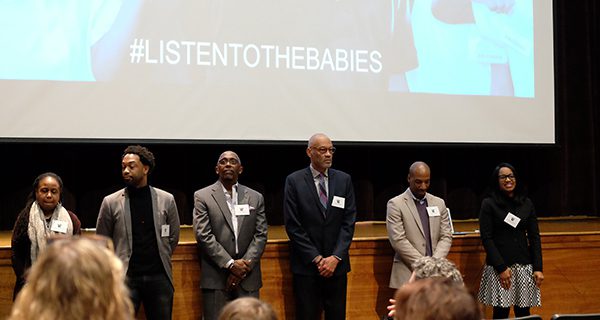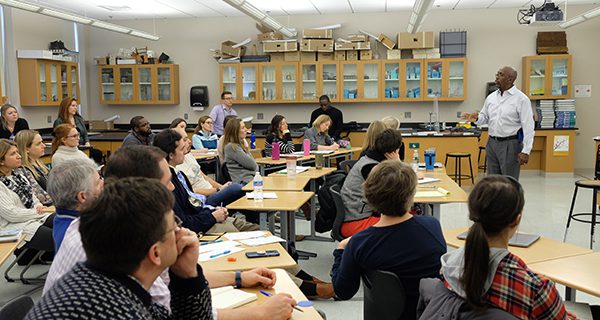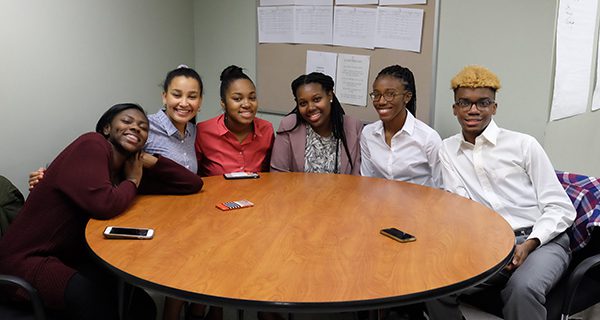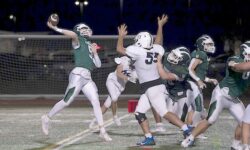During an extraordinary professional development day for Westwood teachers and staff, six students took to the stage of Westwood High School’s auditorium to talk openly about their perceptions of being students of color in a majority-white school district. Their appearance highlighted a day-long examination into race, which was guided by civil rights leader David Johns.
“This is what I enjoy doing,” said Johns. “Conversation about how we can ensure all students at Westwood thrive.”
One in five Westwood students identifies their race or ethnicity as other than white. The district has actively promoted what it calls “courageous conversations,” according to Westwood’s METCO Director Sheryl Goodloe, who invited Johns to the professional development day on November 26. She called it “groundbreaking for a suburban district to spend a whole day talking about race.”
 “We want to invest in our teachers and provide training and support they need to notice when kids are feeling like they’re not seen or heard. I think this was a great start,” said Allison Borchers, Westwood’s assistant superintendent of schools, stressing that the primary goal of a professional development day is ultimately to improve student learning in an environment where all students feel safe, supported, and engaged.
“We want to invest in our teachers and provide training and support they need to notice when kids are feeling like they’re not seen or heard. I think this was a great start,” said Allison Borchers, Westwood’s assistant superintendent of schools, stressing that the primary goal of a professional development day is ultimately to improve student learning in an environment where all students feel safe, supported, and engaged.
Kristina Almeida, a junior at Westwood High, was among the students who made prepared remarks.
“I want people to be more aware and try to learn more about what they don’t know,” she said. “It was kind of scary talking and being so honest in front of the teachers. I was just thinking: ‘I hope they hear me, and listen.’”
Another speaker, junior Jai Mathis, said after the event: “I wanted people to know there should be more of a diverse teacher population in the schools. The black group is not really represented.”
 “People recognize [race] is a really important topic and there is a lot of interest in continuing these types of discussions,” said Jonas Sherr, Westwood’s professional development coordinator and a high school social studies teacher. “It’s pretty rare to see such universality of interest and appreciation for a program. The feedback was very positive and people are determined to do more.”
“People recognize [race] is a really important topic and there is a lot of interest in continuing these types of discussions,” said Jonas Sherr, Westwood’s professional development coordinator and a high school social studies teacher. “It’s pretty rare to see such universality of interest and appreciation for a program. The feedback was very positive and people are determined to do more.”
David Johns is the former executive director of the White House Initiative on Educational Excellence for African Americans during the Obama Administration; he now leads the National Black Justice Coalition. When he and Goodloe met at a recent METCO Directors Association conference and mapped out what they could present to Westwood teachers and staff, an important component was bringing students’ voices into the conversation.
“I simply accepted the invitation to hold space with [the students] to ask them what they need to thrive. What we have done in this space, you can do with your students and your classrooms and your schools,” Johns said, noting that “far too often, we gloss over these conversations.”
“Having the kids on stage was a game-changer,” said Borchers. “The kids are what made it stick for people. Even when some of what they said made people feel a bit uncomfortable.”
“I’m hopeful it can change attitudes, especially for younger grades and at other schools. They may feel the same way I do, and haven’t found their voice to express that. For me, being able to say something about it gives me hope for them to speak up, as well,” said junior Dawnesha Dwyer, one of the presenters. “My message is not only for Westwood. It’s for people in other communities, as well.”

























